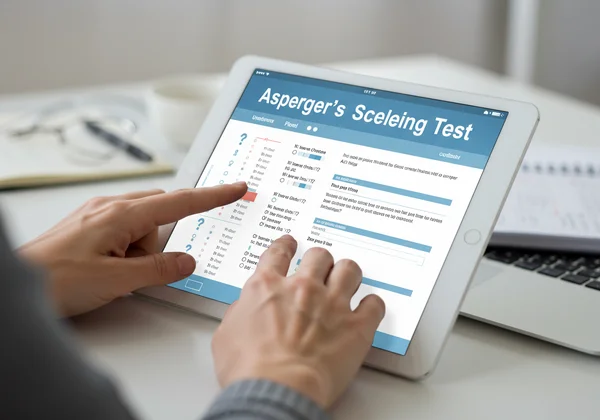Asperger's Test for Adults: Symptoms, Diagnosis & Life Strategies
October 27, 2025 | By Jasper Finch
Are you an adult wondering if you might have Asperger's Syndrome? It's a journey of self-discovery many adults embark on, often seeking clarity after years of feeling slightly different from those around them. This comprehensive guide is designed to offer that clarity. We will explore common symptoms, the path to diagnosis, and practical strategies for thriving. What are the symptoms of undiagnosed Asperger's in adults? This question is a powerful starting point. We understand this path can be complex, and our goal is to provide a well-researched, empathetic resource to help you better understand yourself or a loved one. Your journey to insight can begin right now with an online screening tool.

Recognizing Asperger's Symptoms in Adults
Understanding the traits associated with Asperger's Syndrome (now largely diagnosed under the umbrella of Autism Spectrum Disorder, or ASD) is the first step. In adults, these signs can be subtle, having been masked or adapted over a lifetime. They typically fall into a few key areas of daily life.
Social Communication & Interaction Differences
For many adults, the most noticeable challenges are in the social sphere. This isn't about being shy or introverted; it's about the underlying mechanics of social interaction feeling less intuitive. You might find it difficult to interpret nonverbal cues like body language, tone of voice, or facial expressions, leading to misunderstandings.
Many also find small talk challenging or uninteresting, preferring to dive deep into topics that fascinate them. This can sometimes be perceived by others as being blunt or abrupt, even when no offense is intended. It's simply a more direct and logical communication style. If you've ever felt like you missed a social rule that everyone else seems to know, this could be a familiar experience.
Repetitive Behaviors & Special Interests
A strong preference for routine and predictability is a hallmark trait. You may find comfort in having a set daily schedule, eating the same foods, or taking the same route to work. Unexpected changes can be genuinely distressing and may cause significant anxiety. This need for consistency helps make a chaotic world feel more manageable and secure.
Furthermore, many individuals with Asperger's have deep, passionate, and highly focused interests. These are more than hobbies; they are areas of profound expertise and fascination. Whether it's computer programming, ancient history, or train schedules, this ability to concentrate can be a remarkable strength, leading to incredible knowledge and skill in a specific domain.

Sensory Sensitivities, Unique Strengths, and Your Neurotype
The world can often feel like it's turned up to maximum volume. Sensory sensitivities are very common. You might be unusually sensitive to bright lights, loud noises, certain textures in food or clothing, or strong smells. This can lead to sensory overload, which is both physically and emotionally draining.
Conversely, this unique wiring comes with significant strengths. Many people on the spectrum possess exceptional logical and analytical thinking skills, a keen eye for detail, and an unwavering sense of honesty and loyalty. Recognizing these positive traits is crucial. You can gain a clearer picture of your own profile by taking an adult aspergers test.
The Path to Understanding: Self-Screening & Professional Diagnosis
If the characteristics described above resonate with you, your next question is likely about confirmation. The path to understanding involves both self-exploration and, if you choose, a formal assessment. It's a personal journey, and you are in control of the next steps.
Can I Test Myself for Asperger's? The Role of Online Screeners
Yes, you absolutely can take the first step yourself. A well-designed online aspergers test can be an invaluable tool for initial insight. These screeners, like the online aspergers test offered here, are often based on scientifically validated questionnaires used in clinical research, such as the Autism-Spectrum Quotient (AQ) and the RAADS-R.
An online screener provides a private, anonymous way to explore your traits and see how they align with those commonly associated with the autism spectrum. It is not a diagnosis, but it provides a structured snapshot of your experiences and can be a vital piece of information to help you decide whether to seek a professional evaluation.

What to Expect from a Professional Asperger's Assessment
Should you decide to pursue a formal diagnosis, the process is comprehensive. A qualified professional, such as a psychologist or psychiatrist, will conduct a series of interviews and diagnostic assessments. They will ask detailed questions about your developmental history from childhood to the present, as well as your current social, professional, and personal life.
They may use standardized diagnostic tools and might also want to speak with a family member who knew you as a child. The goal is to build a complete picture of your life experiences and neurotype. This process validates your experiences and can provide access to support and accommodations.
The Importance of a Formal Diagnosis (and Its Limitations)
A formal diagnosis can be life-changing. It can provide a profound sense of validation and self-acceptance, finally giving a name to a lifetime of feeling different. It can also open doors to workplace accommodations and therapeutic support tailored to your specific needs.
However, it's also important to recognize its limitations. A diagnosis doesn't change who you are. You are the same person you were before. For many, the most powerful part of the process isn't the label itself, but the self-understanding that comes with it. This is why a tool like a free aspergers test can be so empowering as a first step.
Thriving with Asperger's: Strategies for Adult Life
Receiving insights, whether from an online test or a formal diagnosis, is not an endpoint. It’s the beginning of a new chapter—one where you can leverage your unique strengths and develop strategies to navigate challenges more effectively. This is not about "fixing" anything; it's about creating a life that works in harmony with your neurotype.
Navigating Relationships & Social Interactions
Understanding your own communication style is key. You can learn to consciously identify social cues or even explain your communication preferences to trusted friends, partners, and family. For instance, letting someone know that you appreciate directness can prevent misunderstandings. Seeking relationships with people who share your special interests can also lead to more fulfilling and natural social connections.
Maximizing Strengths in Your Career & Education
Many careers are perfectly suited to the Asperger's mind. Roles that require deep focus, pattern recognition, logical analysis, and attention to detail—such as in IT, engineering, science, or academia—can be incredibly rewarding. Advocate for a work environment that plays to your strengths, such as a quiet workspace to minimize sensory overload or communication primarily through writing.
Self-Care & Managing Sensory Overload
Developing a self-care toolkit is essential for managing sensory overload. This might include noise-canceling headphones, sunglasses for bright environments, or taking planned "downtime" to decompress after socially demanding events. Recognizing your sensory triggers and planning for them is a proactive way to maintain your well-being. Regular exercise, a consistent sleep schedule, and engaging in your special interests are also powerful forms of self-care.

Your Journey to Self-Understanding Starts Now
Exploring whether you have Asperger's as an adult is a profound step toward self-awareness and empowerment. It's about understanding how your brain is wired and learning to work with it, not against it. By recognizing the symptoms, understanding the path to diagnosis, and implementing life strategies that honor your needs, you can build a fulfilling and authentic life.
This journey is yours to navigate, but you don't have to do it without information. If this guide has resonated with you, the next logical step is to gather more personalized insight. We encourage you to start your journey with our private, scientifically-based screening tool.
Frequently Asked Questions About Asperger's in Adults
Can I test myself for Asperger's?
Yes, you can begin your journey of self-discovery with an online screening tool. A reliable aspergers test for adults, like the one available on our site, uses questions from established clinical research to give you an initial score and insight into your traits. It’s a confidential and accessible first step before considering a professional evaluation.
What are the symptoms of undiagnosed Asperger's in adults?
Common symptoms include difficulties with social intuition and interpreting non-verbal cues, a strong need for routine, deep and highly focused special interests, and sensory sensitivities to light, sound, or texture. Many adults also report a lifelong feeling of being "out of sync" with their peers. An Asperger syndrome test can help you systematically review these traits.
How do I get tested for Asperger's syndrome?
A formal diagnosis must be made by a qualified healthcare professional, like a clinical psychologist or psychiatrist specializing in adult autism. The process typically involves in-depth interviews about your personal history and current challenges, and may include standardized diagnostic tests. Taking an online screener first can provide valuable information to share during this process.
What are the positive traits of Aspergers?
There are many! Individuals on the spectrum often exhibit remarkable strengths, including intense focus and concentration, excellent logical and analytical skills, a meticulous eye for detail, strong loyalty, and a deep sense of justice and honesty. Understanding these positive traits is a key part of embracing your neurotype.